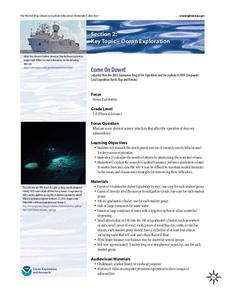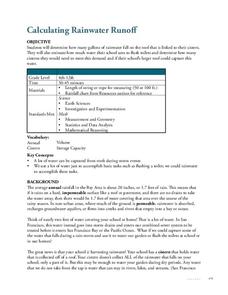GLOBE Program
Calculating Relative Air Mass
Combine math and science with fun in the sun! Scientists build a solar gnomon using reusable materials to calculate relative air mass. Mathematicians measure the pole's shadow and use the data to solve for relative air mass....
Curated OER
WS 1.0 Math Skills Update
In this math skills worksheet, students solve a variety of basic math problems such as solving for "x" in different types of equations, manipulating algebraic expressions, converting from ordinary notation to scientific notation and...
Las Cumbres Observatory
Calculating the Age of Solar System Objects
The number of craters on the surface of solar system objects has a direct correlation to its age. Learners use the concept to determine the age of several objects in the solar system. Using satellite images, they count craters within a...
Learning Games Lab
Logarithm Calculator
Support your young scientists' knowledge of logarithms with a quick video lesson. The instruction first presents the relationship between a base-10 logarithm and an exponential equation. It then demonstrates how to use a calculator to...
Chicago Botanic Garden
Calculating Your Ecological Footprint
You can lower your ecological footprint by recycling! Lesson four in this series of five has individuals, through the use of a computer, calculate their ecological footprints. Through discussions and analysis they determine how many...
Howard Hughes Medical Institute
Calculating Iridium Fallout from an Asteroid Impact
Should we be afraid of a large asteroid impact on Earth today? Young scientists estimate the size and composition of an asteroid similar to the one that caused the K-T mass extinction. They apply algebraic formulas to answer questions...
Bonneville
Using a Multimeter to Analyze a Solar Circuit: Measuring Current and Voltage—Calculating Power and Resistance
Power to the people who understand electricity. A simple experiment teaches pupils how to set up an electric circuit that includes a solar module and how to measure voltage and current using a multimeter. They calculate power and...
Texas State Energy Conservation Office
Nuts! Calculating Thermal Efficiency
Oh nuts! Do macadamias or almonds produce more thermal energy? Energy enthusiasts find out with this experiment. The objective is to demonstrate to your class how the chemical energy contained in foods can be converted into useable...
Curated OER
What's The Story?
Teams of learners integrate reading, writing, math, social studies, and science in this simple, yet effective lesson. They work in groups in order to solve a ten-step problem which requires internet research, the use of a calculator, and...
Chicago Botanic Garden
Calculating Your Carbon Footprint
Unplugging from technology for one day per week will decrease your carbon footprint—are you up to the challenge? Part two in a series of three allows individuals to explore their personal carbon footprints. By first taking a quiz at home...
NOAA
Come on Down!
What do we do when a dive is too dangerous for humans to accomplish? Send in the robots! Middle school scientists get acquainted with several different models of submersible robots in the second lesson of six from NOAA. Lab groups then...
Curated OER
The Study of Molecular Orientation by Linear Dimension Change of Polymeric Films
Young scholars investigate the linear dimension change of heated plastic film and relate the results to processing and service use of the materials. They calculate percent change in dimension as related to anisotropy and molecular...
Science Geek
pH Calculations
Performing calculations is for more than just mathematicians — it's an important science skill, too. Demonstrate the pH calculations using the slide show resource. The final resource of a seven-part unit introduces young scientists to...
Techbridge Curriculum
Calculating Rainwater Runoff
Thirsty plants soak up every bit of a rainfall, but what happens to the rain that hits the roof? Calculate the amount of rainwater from your school's roof with an Earth science activity, which brings measurement skills, observation...
Curated OER
Stream Study
Students study the characteristics of a stream habitat. In this life science lesson plan, students use sieves, nets, and jars to collect aquatic organisms. Students also measure the temperature of the stream and calculate the speed of...
Curated OER
Designing a Study
Students explore features to consider when designing a scientific study. In this science research lesson plan, students examine different methods of data collection and consider which method would be appropriate for determining how many...
Curated OER
The Disappearing Kelp Forest
Learners observe the effect "El Nino" left on kelp plants and sea urchins. They analyze the data collected by researchers, by graphing it on a TI calculator. Before graphing and analyzing the data, you may want to revisit the events of...
Curated OER
Exploring the Hudson in 1609
While this instructional activity focuses on a study of the Hudson River, it could be used as a template for a discussion of map skills, converting measurements, and plotting a route. The instructional activity includes vocabulary and...
Curated OER
Explore Surface Types on a Journey Around Earth
Students explore satellite data. In this technology cross-curriculum math and world geography instructional activity, students locate specific map areas using a microset of satellite data. Students use technology and math skills to...
Teach Engineering
Start Networking!
Class members create their own social networks by collecting signatures before graphing the interactions with their fellow classmates. The degree distribution of the simulated social network is determined by calculating the degree of...
Howard Hughes Medical Institute
Human Impacts on Biodiversity
Have you always wanted to take your science class on an amazing field trip they will never forget? Now you can! Observe the wildlife in an African savanna through trail cameras with a five-part data analysis activity. Learners analyze...
Baylor College
Your Energy Needs (BMR)
How many Calories one needs on a daily basis is dependent on a number of factors including gender, height, and activity level. In the third of seven lessons about energy and food, young nutritionists calculate the number of Calories...
Baylor College
Calculating Exponential Growth
There can be a steep learning curve when teaching about exponential growth, but the lesson helps kids make sense out of the concept. When talking about exponential growth of viruses, learners may not be very interested, but when you are...
Chemistry Collective
Virtual Lab: Making Stock Solutions from Solids
Combine a little solid and a little water and the solution is clear! An experimental lesson has individuals make calculations to create a sample solution of a given volume and molarity. They then create the solutions using a virtual lab...
Other popular searches
- Graphing Calculator Skills
- Calculator Skills Memory
- Calculator Skills Ti84
- Calculator Skills Code Words























